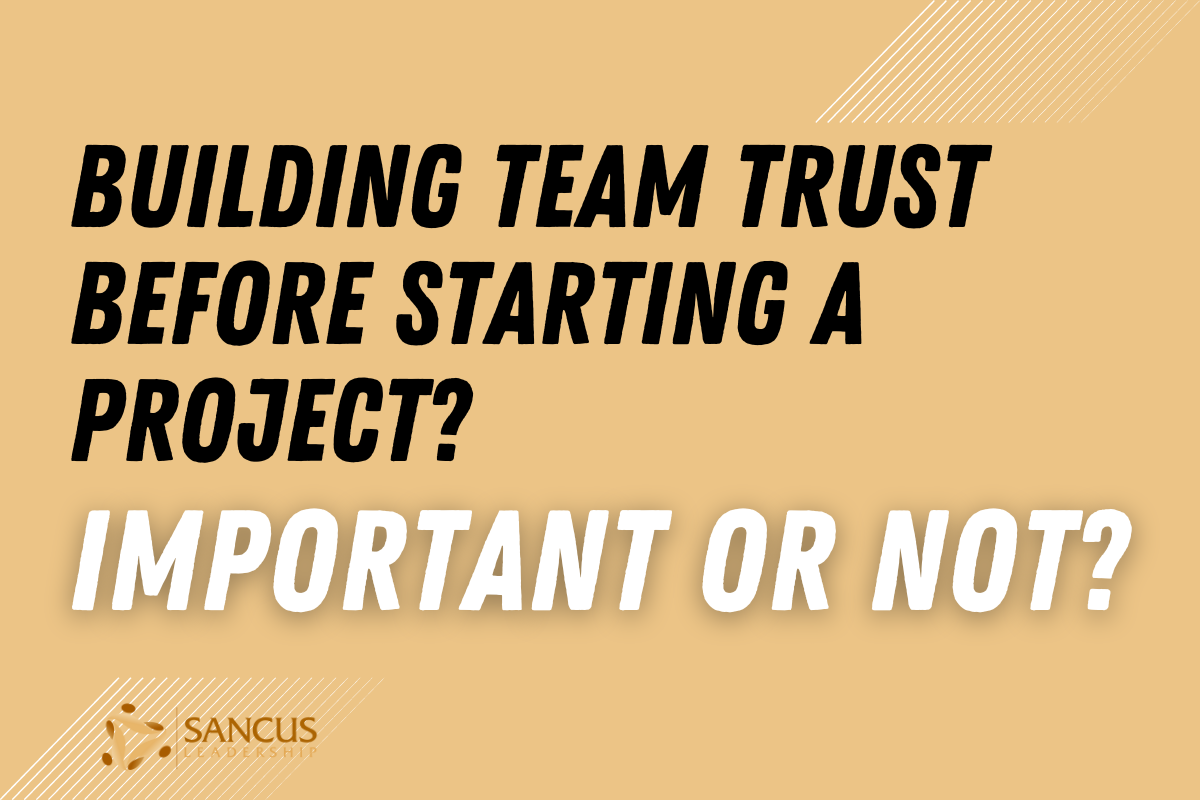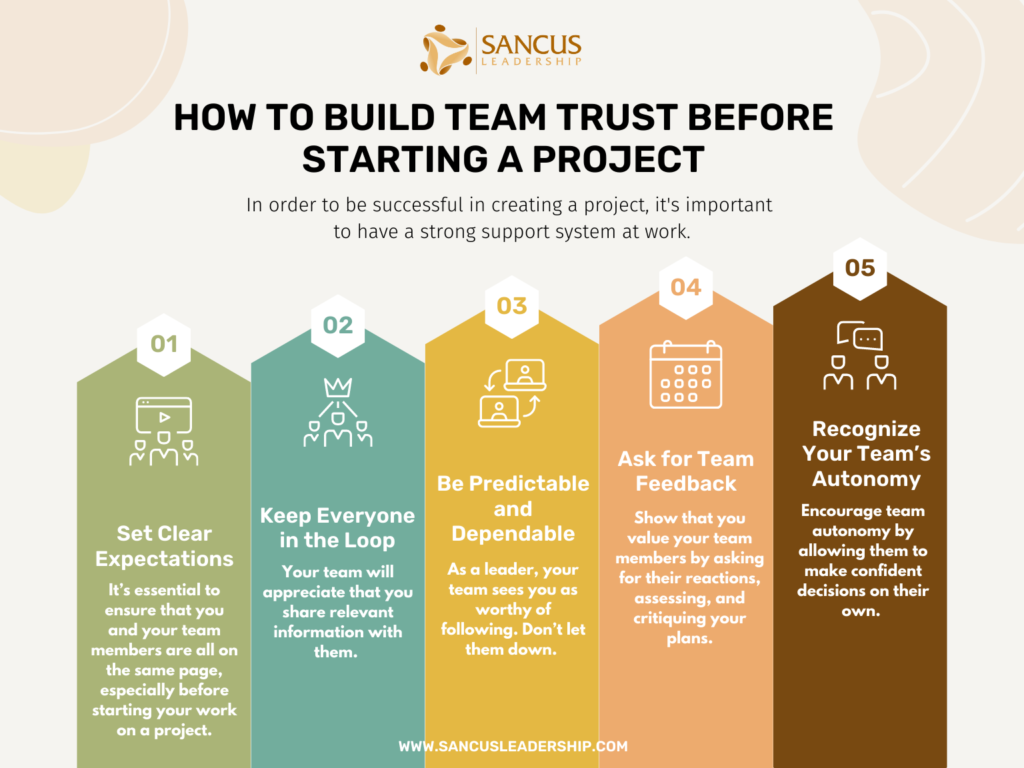Your cart is currently empty!

Build Team Trust Before Starting a Project? Important or Not?
Do you rush headlong into projects, especially if it’s about something that excites you and you are eager to take the first steps toward delivering excellent results? Do you think that promptly making progress is a mark of outstanding leadership? Remember, recklessly rushing into projects without laying the groundwork can lead to many problems with team dynamics and work quality.
Building trust with your team before starting a project is essential since it paves the way for enhanced motivation, more vital teamwork, and high productivity. It also helps avoid issues, such as false speculations and masking weaknesses. Trust is essential in assisting teams to function efficiently.
This article discusses why fostering trust is crucial before starting a team project and the possible repercussions if faith isn’t fully established within the team. We will also discuss the benefits of having trust as a team’s foundation and how it can make a significant difference in how you function as a leader and how your employees interact with you and one another. Let’s start!
Is Trust Necessary for a Team To Be Productive?

“The secret of making progress is to get started.” — Mark Twain
This quote by the famous American author is a great mantra to adopt because it implies efficiency, initiative, and productivity. Some leaders take this to heart and get off to a running start, thinking that progress — and a quick one — is an excellent indication that their team is at the top of their game.
Be that as it may, there is also danger in starting projects way before you and your team are primed and well-equipped. Often, energy, resources, and effort may go to waste when a team must prepare to carry projects through successfully.
Some leaders think trust is earned over time, so they assume it will naturally develop and blossom within the team as they spend more time with each other. They don’t think time expenditures fostering trust are worthwhile and necessary. This notion may not be entirely wrong, but it threatens a team’s stability and productivity.
What Can Happen When Trust Isn’t There?

Trust is the foundation with which positive, strong relationships are built. When you trust someone, you imply that they’re honest, reliable, effective, loyal, and skilled, and you feel safe around them.
Trust is the foundation with which positive, strong relationships are built. When you trust someone, you imply that they’re honest, reliable, effective, loyal, and skilled, and you feel safe around them.
When trust isn’t established before starting your project, you and your team members may struggle to collaborate efficiently. Team members may unnecessarily waste precious energy trying to protect their interests. You may work to lead your team because you spend too much time convincing them you’re reliable and proficient.
Here are some other possible scenarios when a team lacks trust before the start of a project:
- You’re inclined to micromanage your team, leading to strained relationships and employee demotivation.
- Relevant information won’t be openly shared because everyone seems on edge and suspicious of everyone else’s true intentions.
- Accepting and implementing new ideas will be a struggle since everyone hesitates to take other people’s suggestions.
- Team members will feel hesitant about making their weaknesses known, a detrimental action that may cause irreversible damage to the proper completion of the project.
| Scenarios when a team lacks trust before starting a project | Description |
| You’re inclined to micromanage your team, leading to strained relationships and employee demotivation. | Micromanaging your may seem that you don’t trust your team enough to do their work alone. |
| Relevant information won’t be openly shared because everyone seems on edge and suspicious of everyone else’s true intentions. | Not sharing information may lead to demotivation since they will feel like that they are not part of the team. |
| Accepting and implementing new ideas will be a struggle since everyone hesitates to take other people’s suggestions. | If everyone hesitates to give new ideas, then it will only lead the team to be broken. |
| Team members will feel hesitant about making their weaknesses known, a detrimental action that may cause irreversible damage to the proper completion of the project. | If team members do not let their weaknesses known, then the team will not give their best in the project because of a lack of trust. |
Why Trust Matters at the Onset

In the workplace, fostering trust within a team gives rise to open and honest communication, better collaboration, job satisfaction, and higher productivity. It helps fuel tasks and projects to be accomplished promptly and efficiently.
Furthermore, trust among team members builds loyalty and commitment to the team. It allows people to interact and work harmoniously with each other, thereby encouraging the development of high-performance teams.
How To Build Team Trust Before Starting a Project

It’s crucial to get off on the right foot regarding project management. At Sancus Leadership, we value forging unbreakable trust because it enhances motivation, collaboration, and productivity. When you’re ready to make your team more synergistic and efficient, book a call with us, and let’s make you the trusted leader your career needs!

Here are some tips to get you started:
1. Set Clear Expectations
It’s essential to ensure that you and your team members are all on the same page, especially before starting your work on a project. This is the best time to inform them about what needs to be done, why it must be carried through, how to do it, and when it needs to be accomplished.
2. Keep Everyone in the Loop
Encourage transparency in your team by providing them with updates and feedback on even the most minute tasks related to the project. For instance, let them know that approval has been secured for a task force to be formed that deals with client relations or that the company will purchase new laptops specifically for the project at hand.
Your team will appreciate that you share relevant information with them. This will make them feel “included” and help quickly establish a strong sense of unity and camaraderie within the team.
You can do this through various creative ways, such as:
- Posting updates on a whiteboard or corkboard situated in a common area in the workplace
- Setting up an online group and posting updates there (you can use chat apps like Slack, Telegram, Google Chat, or Troop Messenger)
- Calling for weekly short meetings
3. Be Predictable and Dependable
Make sure to deliver on your promises. If the winds have changed and your original plan is no longer feasible, clearly explain to your team why you’re abandoning the project in favor of a better one.
Also, lead by example. As a leader, your team sees you as worthy of following. Don’t let them down. Ensure you always display the specific virtues and values you expect from everyone else. Be the first to showcase trustworthiness, and you can be sure your team members will follow your lead.
Be the first to showcase trustworthiness, and you can be sure your team members will follow your lead.
4. Ask for Team Feedback
Show that you value your team members by asking for their reactions, assessing, and critiquing your plans. After all, they’re directly involved in the project, so their feedback will be invaluable for its success.
This is also a great way to boost your team’s morale by showing them you value their thoughts, opinions, and feelings. This will allow you to get the team’s pulse on the project — how they feel about it, what its relevance is to them, and whether or not they feel motivated about it. Gathering feedback will allow you to correct possible misconceptions your team members may harbor.
5. Recognize Your Team’s Autonomy
Encourage team autonomy by allowing them to make confident decisions on their own. Listen to their proposals and will enable them to implement these on their terms. Doing so gives your team the impression that you trust them and are confident in their skills.
Encourage team autonomy by allowing them to make confident decisions on their own.
You can also delegate tasks by taking into account each member’s strengths. Then, allow them to execute tasks with minimal interference from you. Employees who feel their leaders trust them are keen on never tarnishing the confidence and faith bestowed on them.
Don’t forget to give credit where credit is due. Recognize employees who have shared valuable proposals and ideas. As a leader, never take credit for any hard work or a brilliant idea that any team member has shared.
Here’s a talk with Simon Sinek explaining why building trust in a team first is important and a must.
Final Thoughts
Trust is essential in a high-functioning, collaborative team. When a project is at hand, it’s crucial to establish trust to ensure that you and your employees operate like a well-oiled machine. Without it, the team could quickly fall apart.
Foster trust before starting your project by spearheading the formation of an ethical, transparent work culture. Your team should know about the project’s whats, whys, hows, and whens, and they must be kept updated on any progress or changes. As a leader, walk the talk and show your team exactly what being trustworthy is all about.
